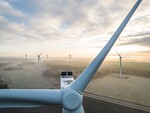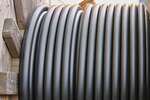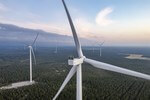01/12/2004
Mortality of birds and bats attracted by wind turbines tracked by monitoring report in the USA
According to the Nine Canyon Avian and Bat Monitoring Report Wind turbines kill from 0.9 to 4.7 birds for every megawatt of installed capacity, according to an assessment of avian and bat deaths in the United States. Each of the 37 turbines at the Nine Canyon windfarm in Washington kills 3.6 birds and 3.2 bats a year, concludes a year-long monitoring report prepared by WEST Inc of Wyoming and Northwest Wildlife Consultants of Oregon. Fatalities could have been caused by strikes with turbine towers or blades, collision with vehicles travelling along project roads, or other non-project related causes, it concludes, “although true cause of death is unknown for most of the fatalities.” Some fatalities may have been the result of predator kills, but the study group agreed that all fatalities would be attributed to the wind turbines unless another cause of death could be determined.
Mortality has been estimated only once during baseline studies of new windfarms, during a four-year study at Buffalo Ridge in Minnesota, where 2,482 fatality searches were conducted before turbines were installed, resulting in reference rates of 1.1 birds per plot per year, compared to 0.98, 2.27 and 4.45 fatalities per turbine after the windfarms were finished. “When adjusted fatality rates are standardized to 3,000 m2 rotor swept area or to 1 MW of nameplate power output, bird and bat fatality rates at Nine Canyon are in the range of observed at other new generation wind projects,” it concludes. Studies at the Foote Creek Rim Wind Project show that fatalities are three to four times higher at guyed meteorological towers compared with wind turbines. Tall lighted structures “are suspected of attracting nocturnal migrating birds, especially during inclement weather,” and high-intensity continuously-lit red lights “are believed to be more of an attractant than other types,” it notes.
Mortality has been estimated only once during baseline studies of new windfarms, during a four-year study at Buffalo Ridge in Minnesota, where 2,482 fatality searches were conducted before turbines were installed, resulting in reference rates of 1.1 birds per plot per year, compared to 0.98, 2.27 and 4.45 fatalities per turbine after the windfarms were finished. “When adjusted fatality rates are standardized to 3,000 m2 rotor swept area or to 1 MW of nameplate power output, bird and bat fatality rates at Nine Canyon are in the range of observed at other new generation wind projects,” it concludes. Studies at the Foote Creek Rim Wind Project show that fatalities are three to four times higher at guyed meteorological towers compared with wind turbines. Tall lighted structures “are suspected of attracting nocturnal migrating birds, especially during inclement weather,” and high-intensity continuously-lit red lights “are believed to be more of an attractant than other types,” it notes.
- Source:
- Online editorial www.windfair.net
- Author:
- Trevor Sievert, Online editorial journalist
- Email:
- press@windfair.net
- Keywords:
- USA, wind turbines, wind energy, wind project

























